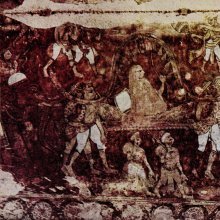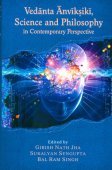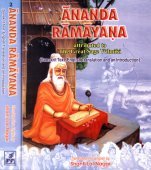Advaita: 21 definitions
Introduction:
Advaita means something in Hinduism, Sanskrit, Marathi, Hindi. If you want to know the exact meaning, history, etymology or English translation of this term then check out the descriptions on this page. Add your comment or reference to a book if you want to contribute to this summary article.
Alternative spellings of this word include Advait.
Images (photo gallery)
In Hinduism
Vedanta (school of philosophy)
Source: archive.org: Preceptors of AdvaitaThe basic truth of Advaita is that the Self (Ātman) alone is real, and that all else is mithyā. Not understanding the implication of the words mithyā and māyā, the critics find fault with Advaita. Although ultimately the world of plurality is not real, it is not that it is not useful. Because the world of māyā is useful until the onset of wisdom, it is vested with empirical reality (vyāvahārika satya). It is in this world, and while living in it, that we have to strive for and gain release from bondage. The true mokṣa is the attainment of all-selfhood, in this very life, by the removal of māyā through knowledge. The followers of the different religions think that their particular mode of worship alone is the true mode. But we who follow Advaita believe that it is the same God that is attained through any of the religious modes, and that devotion to God is essential for realizing the truth of Advaita.
Source: Shodhganga: Siva Gita A Critical Study1) Advaita (अद्वैत) refers to “non-dual; not two-fold’’—Non-duality or monism. The doctrine that Ultimate Reality consists of a one principle substance, or God. Opposite of Dvaita, dualism.
2) Advaita (अद्वैत) or Advaitagītā refers to one of the sixty-four Gītās commonly referred to in Hindu scriptures.—Gītā is the name given to certain sacred writings in verse (often in the form of a dialogue) which are devoted to the exposition of particular religious and theosophical doctrines. Most of these Gītās [i.e., Advaita-gītā] originate from the Mahābhārata or the various Purāṇas.

Vedanta (वेदान्त, vedānta) refers to a school of orthodox Hindu philosophy (astika), drawing its subject-matter from the Upanishads. There are a number of sub-schools of Vedanta, however all of them expound on the basic teaching of the ultimate reality (brahman) and liberation (moksha) of the individual soul (atman).
Shaktism (Shakta philosophy)
Source: Google Books: ManthanabhairavatantramAdvaita (अद्वैत) refers to “non-dual” and is used to describe Kaula, according to the Manthānabhairavatantra, a vast sprawling work that belongs to a corpus of Tantric texts concerned with the worship of the goddess Kubjikā.—Accordingly, [while expounding Kaula and the Nine Kaulas]—“Devoid of (phenomenal) being, without lord, I praise Kaula, which is ever manifest. Free of Dharma and Adharma, liberation and bondage , I praise Kaula; non-dual (advaita), omnipresent and eternal, it is (both) supreme (transcendent) and inferior (immanent)”.

Shakta (शाक्त, śākta) or Shaktism (śāktism) represents a tradition of Hinduism where the Goddess (Devi) is revered and worshipped. Shakta literature includes a range of scriptures, including various Agamas and Tantras, although its roots may be traced back to the Vedas.
Yoga (school of philosophy)
Source: ORA: Amanaska (king of all yogas): A Critical Edition and Annotated Translation by Jason BirchAdvaita (अद्वैत) refers to “(the state of) non-duality”, according to the Amanaska Yoga treatise dealing with meditation, absorption, yogic powers and liberation.—Accordingly, as Īśvara says to Vāmadeva: “[...] The mind alone is the cause of people’s liberation and bondage. The mind which clings to sense objects [leads] to bondage, and the mind which is free from sense objects, to liberation. All this, whatever is moving and motionless, is [just] a visible object of the mind. For, when the mind has become free of the mind, [Yogins] call it the state of non-duality (advaita-bhāva). [...]”.

Yoga is originally considered a branch of Hindu philosophy (astika), but both ancient and modern Yoga combine the physical, mental and spiritual. Yoga teaches various physical techniques also known as āsanas (postures), used for various purposes (eg., meditation, contemplation, relaxation).
Shaiva philosophy
Source: archive.org: Chittanubodha Shastram By Bhaskara KanthaAdvaita (अद्वैत) refers to the “non-duality” (of Śiva and Śakti).—The Kashmir Śaiva thinkers believe in pluralism because not all human beings are alike and the different paths and Philosophies are meant for different kinds of people. [...] The dynamism of the world flows from the very heart of vibrative Consciousness or spanda. This is also related to the conception of Śiva’s Śaktis or dynamic Energies. The Śaktis are not separate from Śiva, hence there is complete advaita or non-duality, but they manifest his creative activity flowing out, as well as the cognitive activity flowing back to the source (icchā, jñāna and kriyā-śaktis). The Śaktis have the power both to conceal and to reveal the Supreme Reality. Śiva himself is absolute Freedom (svātantrya), and if he creates, he creates out of this freedom and overflowing bliss.
-
Languages of India and abroad
Marathi-English dictionary
Source: DDSA: The Molesworth Marathi and English Dictionaryadvaita (अद्वैत).—n (S) advaitamata n (S) The doctrine of the identity of the human soul and the divine essence, or of the Deity and the universe; pantheism.
--- OR ---
advaita (अद्वैत).—n (S) advaitabhāva m (S) Unity of sentiments and views or of interests and feelings; close intimacy, familiar friendship.
Source: DDSA: The Aryabhusan school dictionary, Marathi-Englishadvaita (अद्वैत).—n Pantheism. The doctrine of the identity of the human soul and the divine essence
--- OR ---
advaita (अद्वैत).—n avdaitabhāva m Close intimacy. Unity of sentiments, views or of the in- terests and feelings.
Marathi is an Indo-European language having over 70 million native speakers people in (predominantly) Maharashtra India. Marathi, like many other Indo-Aryan languages, evolved from early forms of Prakrit, which itself is a subset of Sanskrit, one of the most ancient languages of the world.
Sanskrit dictionary
Source: DDSA: The practical Sanskrit-English dictionaryAdvaita (अद्वैत).—a. [na. ba.]
1) Not dual; of one or uniform nature, equable, unchanging; °तं सुखदुःखयोः (taṃ sukhaduḥkhayoḥ) Uttararāmacarita 1.39.
2) Matchless, peerless, sole, only, unique.
-tam [na. ta.]
1) Non-duality, identity; especially that of Brahman with the universe or with the soul, or of soul and matter; See अद्वय (advaya) also.
2) The supreme or highest truth or Brahman itself.
3) Name of an Upaniṣad; अद्वैतेन (advaitena) solely, without any duplicity.
Source: Cologne Digital Sanskrit Dictionaries: Shabda-Sagara Sanskrit-English DictionaryAdvaita (अद्वैत).—n.
(-taṃ) Unity, not duality. E. a neg. dvaita duality.
Source: Cologne Digital Sanskrit Dictionaries: Benfey Sanskrit-English DictionaryAdvaita (अद्वैत).—n. being alone, [Rāmāyaṇa] 3, 3, 3.
Advaita is a Sanskrit compound consisting of the terms a and dvaita (द्वैत).
Source: Cologne Digital Sanskrit Dictionaries: Cappeller Sanskrit-English DictionaryAdvaita (अद्वैत).—[adjective] = advaya, [neuter] = advayatva.
Source: Cologne Digital Sanskrit Dictionaries: Aufrecht Catalogus Catalogorum1) Advaita (अद्वैत) as mentioned in Aufrecht’s Catalogus Catalogorum:—son of Bāyabhaṭṭa, grandson of Kṛṣṇa: Rāmaliṅgāmṛtakāvya. Io. 890.
2) Advaita (अद्वैत):—See Advaitārāma.
3) Advaita (अद्वैत):—son of Bāyabhaṭṭa, composed the Rāmaliṅgāmṛta in 1609. Io. 890.
Source: Cologne Digital Sanskrit Dictionaries: Monier-Williams Sanskrit-English Dictionary1) Advaita (अद्वैत):—[=a-dvaita] mfn. destitute of duality, having no duplicate, [Śatapatha-brāhmaṇa xiv, etc.]
2) [v.s. ...] peerless
3) [v.s. ...] sole, unique
4) [v.s. ...] epithet of Viṣṇu
5) [v.s. ...] n. non-duality
6) [v.s. ...] identity of Brahmā or of the Paramātman or supreme soul with the Jīvātman or human soul
7) [v.s. ...] identity of spirit and matter
8) [v.s. ...] the ultimate truth
9) [v.s. ...] title of an Upaniṣad
Source: Cologne Digital Sanskrit Dictionaries: Goldstücker Sanskrit-English DictionaryAdvaita (अद्वैत):—I. [tatpurusha compound] n.
(-tam) 1) Unity, not duality.
2) The iden-tity of Brahman (n.) and the Universe or of the divine essence and the human soul; the real truth.
3) The name of an Upanishad of the Atharvaveda. E. a neg. and dvaita. Ii. [bahuvrihi compound] m. f. n.
(-taḥ-tā-tam) Without a second, only, alone; esp. as an epithet of ātman and brahman (n.) or brahmaloka. E. a priv. and dvaita.
Source: Cologne Digital Sanskrit Dictionaries: Yates Sanskrit-English Dictionary1) Advaita (अद्वैत):—[a-dvaita] (taṃ) 1. n. Unity.
2) [a-dvaita] (taṃ) 1. n. Spirit opposed to matter.
Source: DDSA: Paia-sadda-mahannavo; a comprehensive Prakrit Hindi dictionary (S)Advaita (अद्वैत) in the Sanskrit language is related to the Prakrit word: Addaia.
[Sanskrit to German]
Sanskrit, also spelled संस्कृतम् (saṃskṛtam), is an ancient language of India commonly seen as the grandmother of the Indo-European language family (even English!). Closely allied with Prakrit and Pali, Sanskrit is more exhaustive in both grammar and terms and has the most extensive collection of literature in the world, greatly surpassing its sister-languages Greek and Latin.
Hindi dictionary
Source: DDSA: A practical Hindi-English dictionaryAdvaita (अद्वैत) [Also spelled advait]:—(nm) absence of duality/difference, negation of duality/difference; unity; ~[vāda] monism; ~[vādī] a monist, believer in monism; monistic.
...
Kannada-English dictionary
Source: Alar: Kannada-English corpusAdvaita (ಅದ್ವೈತ):—
1) [adjective] not dual; of one or uniform nature; equable.
2) [adjective] not susceptible to change; unchanging.
3) [adjective] matchless; peerless; incomparable; sole; unique.
--- OR ---
Advaita (ಅದ್ವೈತ):—
1) [noun] = ಅದ್ವೈತಿ [advaiti];2) [noun] perfect identify; sameness; absence of difference.
3) [noun] the quality or state of not being susceptible to change; immutability.
4) [noun] (Phil.) the most famous of the Indian philosophies which propounds that there is one Reality known as Brahman or the Absolute which always existed and always will exist beyond time and space and the individualātman (soul) is identical with That; the philosophy of Oneness or non-duality.
--- OR ---
Advaita (ಅದ್ವೈತ):—
1) [noun] the quality or nature of being what one is and not posing or assuming what is not; uprightness in one’s being what is within.
2) [noun] a man with these qualities; a man of truthfulness.
Kannada is a Dravidian language (as opposed to the Indo-European language family) mainly spoken in the southwestern region of India.
See also (Relevant definitions)
Starts with (+92): Advaita yati, Advaita-vedanta, Advaitabhakti, Advaitabhava, Advaitabhushana, Advaitabodhadipika, Advaitabrahmasiddhi, Advaitabrahmasiddhiviniyogasamgraha, Advaitabrahmasudha, Advaitabrahmavidyapaddhati, Advaitabuddhi, Advaitacandrika, Advaitacarya, Advaitacintakaustubha, Advaitacintamani, Advaitadarpana, Advaitadarshana, Advaitadhikaranacintamani, Advaitadipika, Advaitaditya.
Ends with: Akhiladvaita, Bhavadvaita, Brahmadvaita, Dravyadvaita, Dvaitadvaita, Jnanadvaita, Kevaladvaita, Kripadvaita, Kriyadvaita, Mahadvaita, Paramadvaita, Rasadvaita, Shaktivishishtadvaita, Shivadvaita, Shuddhadvaita, Vijnanadvaita, Vishishta Advaita.
Full-text (+225): Advaitavadin, Advaitananda, Paramadvaita, Advaitopanishad, Attoytam, Advaitavada, Shankara, Bayabhatta, Kripadvaita, Advaita-vedanta, Advait, Advaitamakaranda, Advaitadipika, Advaitabrahmasiddhi, Smarta, Vishishta Advaita, Advaitena, Nyayacandrika, Tattvasamiksha, Kevaladvaita.
Relevant text
Search found 121 books and stories containing Advaita, A-dvaita; (plurals include: Advaitas, dvaitas). You can also click to the full overview containing English textual excerpts. Below are direct links for the most relevant articles:
Hari-bhakti-kalpa-latikā (by Sarasvati Thkura)
Text 12 < [First Stabaka]
Chaitanya Bhagavata (by Bhumipati Dāsa)
Verse 3.9.86 < [Chapter 9 - The Glories of Advaita]
Verse 3.5.493 < [Chapter 5 - The Pastimes of Nityānanda]
Introduction to chapter 19 < [Chapter 19 - The Lord’s Pastimes in Advaita’s House]
Mandukya Upanishad (Madhva commentary) (by Srisa Chandra Vasu)
Karika verse 2.8 < [Chapter 2 - Second Khanda]
Mantra 2.1 < [Chapter 2 - Second Khanda]
Karika verse 2.9 < [Chapter 2 - Second Khanda]
Song 8 < [Advaita-tattwa-kathana (Description of the Truth of Lord Advaita)]
Song 9 < [Advaita-tattwa-kathana (Description of the Truth of Lord Advaita)]
Advaita-tattwa-kathana (Description of the Truth of Lord Advaita) < [Madhya-khaṇḍa]
Shri Gaudiya Kanthahara (by Srila Bhaktisiddhanta Sarasvati)
Sivaprakasam (Study in Bondage and Liberation) (by N. Veerappan)
Interpretations of the Mahavakyas by Umapati Shivam < [Chapter 5 - Concept of Advatia]
Relationships between entities < [Chapter 5 - Concept of Advatia]
Interpretations of the Mahavakyas by Shri Ramanuja < [Chapter 5 - Concept of Advatia]
Related products





